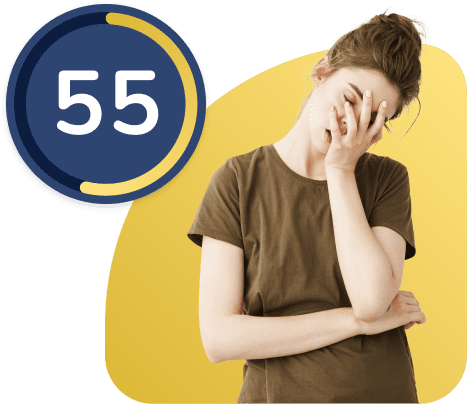As many as two-thirds of adults have symptoms of insomnia like trouble falling asleep or waking up too early. The most common treatments for insomnia include behavior changes, counseling, and medications. But a growing number of researchers are investigating whether meditation might also be effective for treating sleep difficulties.
How Does Meditation Treat Insomnia?
Researchers are still learning about how meditation affects the mind and body. Although the evidence remains limited, some researchers propose that meditation may reduce symptoms of insomnia by addressing stress and negative thoughts related to sleep.
People with insomnia often worry about whether or not they will be able to fall asleep, as well as how sleep loss might affect them the next day. They can become increasingly frustrated with their inability to fall asleep. Over time, they may even develop negative associations with their bed or bedroom.
Mindfulness meditation is a type of meditation that researchers have studied for its use in treating insomnia. Mindfulness meditation involves nonjudgmentally examining thoughts as they emerge in the present moment. The meditator keeps their attention on the thoughts themselves, instead of worrying about how those thoughts relate to the past or future.
In other forms of meditation, the meditator concentrates on a sound, image, repeated phrase, or the act of breathing. Some types of meditation promote relaxation, while others encourage the meditator to explore their thoughts and emotions from a new perspective.
How Often Should I Meditate?
Practicing regularly can help you get the most out of meditation. The amount of time you should spend meditating each day depends on your personal preference, schedule, and the type of meditation. Although research has yet to answer this question definitively, one study found that meditating just 5 to 20 minutes each day helped participants sleep better.
Guided Meditation
Guided meditation, also called guided imagery, is a mind-body practice that uses visualization. During a session, an instructor helps a person relax before having them envision certain images. Some forms of guided meditation may also incorporate breathing, movement, and body scans.
Early evidence suggests that guided meditation may be an effective tool for people experiencing:
- Anxiety
- Depression
- Stress
- Nightmares
Guided meditation can be performed with an instructor, but it can also be done alone using audio recordings or smart phone apps. Many audio resources are available online, including recorded guided meditations designed specifically for sleep.
How Mindfulness Affects Sleep
Experts believe that mindfulness meditation may help people with insomnia relax, distract themselves, or learn to reduce the effects of negative emotions and habitual thought patterns. Rather than trying to make a person fall asleep, it encourages people to change the way they relate to thoughts about insomnia and sleep.
People who have insomnia may dwell on finding an immediate solution to their sleep difficulties and become frustrated when they are not able to do so. This frustration can strengthen negative and counterproductive ideas about sleep, which can make insomnia even worse.
Mindfulness meditation helps people observe thoughts as they arise without acting on or analyzing them. This encourages flexible thinking and helps practitioners let go of recurring thoughts and negative ideas about sleep.
How to Meditate for Better Sleep
There are many types of meditation for sleep and relaxation, and some might take more time or practice than others. It might help to try several kinds of meditation to find out which practice best fits your schedule and helps you get better rest.
It’s easy to feel overwhelmed or intimidated by the vast number of meditative practices that exist. You may want to get started by trying a few simple meditation exercises before bed.
Mindfulness Meditation
Mindfulness meditation stems from spiritual and religious traditions, but has been adapted for use as a treatment in Western medicine. Mindfulness meditation often involves a few simple steps:
- Find a comfortable seat and set an intention for your meditation practice. Your intention may be to relax, let go of stress, or release worries about insomnia.
- Close your eyes, breathe deeply, and pay attention to the sensations created by your breath. As thoughts and distractions arise, make note of them without attachment or judgment.
- Stay seated as long as you’d like. Remember that it’s normal to find yourself getting distracted. Once you do, gently bring your awareness back to your breath.
Another practice of mindfulness is called non-sleep deep rest (NSDR). This a relaxation method is generally used in place of a nap and to regain focus, however, it can help you enter a highly relaxed state in between sleep and wakefulness.
Body Scan
A body scan is a form of mindfulness in which you slowly move your attention from one body part to the next, noticing without judgment the sensations that arise in the present moment. There are several basic steps to trying a body scan at home:
- Remove distractions from your bedroom, then lie down and close your eyes.
- Take a few deep breaths, feeling your breath entering and exiting your body as your stomach rises and falls.
- Shift your attention away from your thoughts and into one foot. Take note of how your foot feels. Keep this focus for a few moments and allow any thoughts and feelings to flow through your mind.
- Take a deep breath and shift your attention to the other foot and repeat the process of noticing and allowing any thoughts or sensation that are present.
- After a few breaths, continue to shift your focus from one body part to another, moving slowly up your legs to your pelvis, abdomen, chest, neck, and then to your head.
- When you’ve finished scanning each part of your body, take several more deep breaths and open your eyes.
Risks of Meditation
While meditation is generally considered safe, more study will be needed to better understand its possible risks. According to researchers, up to 8% of people who meditate may have unpleasant effects, including feelings of depression or anxiety.
Some experts note that negative feelings are an expected part of learning to meditate. Mindfulness can make emotions—even negative ones—feel stronger, as practitioners become more aware of their thoughts and feelings.
Meditation is not for everyone. For example, practices like guided imagery may not be the best option for people who have hallucinations, delusions, or psychosis, or for those with dementia. If you want to try meditation for insomnia but have any questions or concerns, don’t hesitate to reach out to your health care provider or an experienced meditation teacher.
Benefits of Meditation
Recent studies have explored meditation’s potential health benefits beyond relieving insomnia. These studies suggest that meditation might have positive effects on conditions such as:
- Chronic pain
- High blood pressure
- Anxiety
- Substance use disorder
- Obesity
- Depression
- Binge eating
- Post-traumatic stress disorder (PTSD)
- Attention-deficit/hyperactivity disorder (ADHD)
Despite promising results, larger and more rigorous studies are necessary to learn how well meditation works to treat insomnia and other health conditions. Some research has produced contradictory results, and many studies have been small or of low quality. It also remains an open question whether certain types of meditation work better for some conditions than others.
Frequently Asked Questions About Meditation
While mindfulness meditation and cognitive behavioral therapy (CBT) may both be used to treat insomnia, they are different practices. Cognitive behavioral therapy for insomnia (CBT-I) is typically the first treatment that health care providers recommend for reducing insomnia. CBT-I is a form of talk therapy, provided by a trained professional, that may incorporate mindfulness along with other interventions for insomnia.
Although some people learn meditation with a trained practitioner or in a therapeutic setting, there are many resources available for those who want to practice it alone. People may also work with a professional during sessions and practice guided meditation at home.
Experts have not identified any particular practice as being more effective for insomnia than others. However, many studies have focused on mindfulness meditation and its impact on sleep.


































